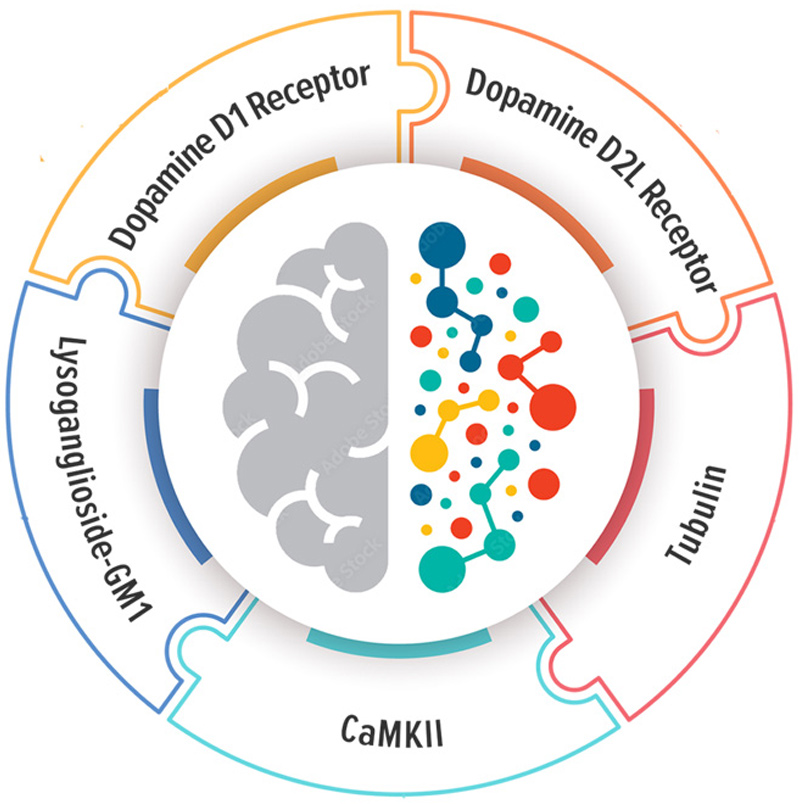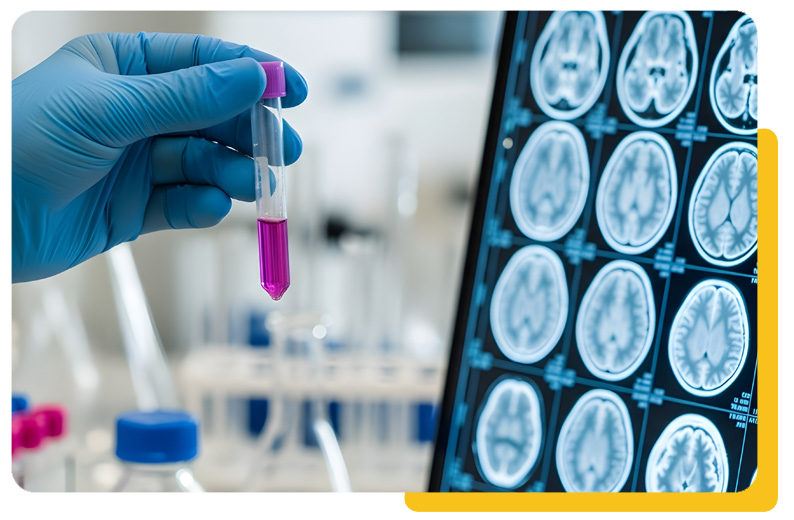Mental Health Solutions

Personalized Mental Health Solutions.
Precision Testing.
When traditional approaches don’t bring relief, it may be time to look deeper for lasting mental health solutions and root causes. Many chronic mental health and neurologic issues — including anxiety, depression, brain fog, tics, OCD behaviors, even seizures — can stem from underlying biological factors that standard care often misses.
In some people, an immune dysfunction, often triggered by infection(s), may be the underlying cause for difficult-to-treat neuropsychiatric symptoms.
Testing gets you to the root cause
Testing with the Autoimmune Brain Panel™ can help identify autoimmune activity affecting the brain and assess the likelihood of underlying infectious triggers.
Frequently, these infections are subclinical – meaning they do not produce physical signs or symptoms. Yet, the infection (whether it’s bacterial, viral or fungal) can still cause an abnormal immune response – that impacts the brain. This can lead to mental health and neurologic symptoms.

Reliable results. Trusted by clinicians worldwide.

Delivering Tailored Mental Health Solutions for Chronically Ill Patients
The Autoimmune Brain Panel™ is the only commercially available test of its kind that assists clinicians in diagnosing and treating autoimmune-induced neuropsychiatric symptoms. The Panel has been utilized by more than 2,800 healthcare providers worldwide, with over 16,000 patients tested – many of whom have been searching for effective mental health solutions for years.
The Panel was developed based on more than two decades of research conducted by Dr. Madeleine Cunningham at the University of Oklahoma, in conjunction with scientists from the National Institutes of Mental Health (NIMH).
Grace’s personality changed almost overnight. She developed OCD, anxiety, mood swings and was prone to uncontrollable rages. The Autoimmune Brain Panel™ uncovered the reason—an infection-driven autoimmune dysfunction.
Why Test?
Evidence of autoimmune process
Test results provide objective, visual proof of an underlying infection-triggered autoimmune etiology – information that can be invaluable to clinicians as they determine an appropriate treatment regimen.
Presence of infection
CaMKII assay results can indicate the presence of a new onset or reactivation of infection or a subclinical or occult chronic infection.
Determines course of treatment
Treatment for autoimmune-induced neuropsychiatric symptoms involves eradicating the infection(s), reducing brain inflammation and treating the immune system with immunomodulatory therapies.
Improves chances of recovery
Early diagnosis and treatment has been shown to improve chances for a full recovery. 3 With proper treatment, symptoms/behaviors are often resolved with significant improvement in symptoms or a complete remission. 4
Reliable test results
The Autoimmune Brain Panel™ demonstrates an overall accuracy of 86%, sensitivity of 88%, and specificity of 83%. 5
Decades of research
The Panel was developed based on more than two decades of research conducted by Dr. Madeleine Cunningham at the University of Oklahoma, in conjunction with scientists from the National Institutes of Mental Health (NIMH).
References
- Shin Y-W, Lee S-T, Park K-I, et al. Treatment strategies for autoimmune encephalitis. Therapeutic Advances in Neurological Disorders. January 2018. doi:10.1177/1756285617722347.
- Brenton JN, Goodkin HP. Antibody-Mediated Autoimmune Encephalitis in Childhood. Pediatr Neurol. 2016 Jul;60:13-23. doi: 10.1016/j.pediatrneurol.2016.04.004. Epub 2016 Apr 12. PMID: 27343023.
Dr. Craig Shimasaki reviews with case of a 16-year-old girl with severe OCD, tics, cognitive difficulties and mood swings whose symptoms resolved after proper diagnosis and treatment.

Anti-Dopamine D1 Receptor
Associated with "psychiatric" symptoms; tends to correlate with mood instability, anxiety, irritability, aggression and, in some cases, psychosis.
Anti-Dopamine D2L Receptor
Associated with "movement" symptoms; tends to correlate with choreiform movements, mycolonus, and exacerbations of hyperactivity.
Anti-Lysoganglioside-GM1
Associated with tics; tends to correlate with complaints of joint or connective tissue pain.
Anti-Tubulin
Assciated with OCD, cognitive interference and "brain fog".
CaMKII – a Cell Stimulation Assay
Associated with sympathetic nervous system activation symptoms; fight or flight behavior, separation anxiety, urinary problems, bedwetting, sensory sensitivites.
Autoimmune Brain Panel™
For patients who have been chronically ill and searching for mental health solutions, the Autoimmune Brain Panel™ is offering new hope—transforming care and making recovery possible.
It is the only test of its kind that’s designed to assist clinicians in identifying and treating patients with neuropsychiatric symptoms caused by an infection-triggered autoimmune dysfunction.
Testing is simple. And involves a single blood draw.

